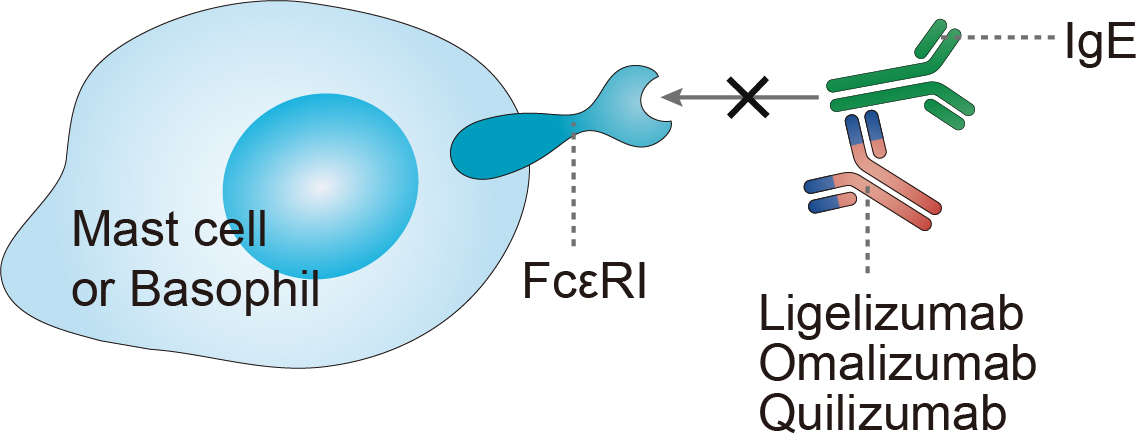Quilizumab Overview
Introduction of Quilizumab
Quilizumab is a humanized, afucosylated, IgG1 monoclonal antibody (mAb) that targets the M1 prime segment of membrane expressed IgE on IgE-switched B cells and plasmablasts. Quilizumab is in clinical development for the treatment of allergic asthma. By causing the depletion of IgE-switched B cells and plasmablasts, it reduces serum IgE levels. These findings suggest that quilizumab may be an effective treatment of chronic spontaneous urticaria (CSU). A recently performed multicenter, double-blind study with 32 adult CSU patients who were symptomatic despite H1 antihistamine treatment with or without LTRAs looked at responses to placebo (n = 17) or 450 mg quilizumab (n = 15) given subcutaneously at Day 1 and Day 29. The absolute change from baseline to week 20 in the weekly itch score (the primary efficacy outcome) decreased by 3.3 points and 1.5 points in patients treated with quilizumab relative to the placebo group at week 4 and 20, respectively. These decreases were not significantly different as compared to placebo and did not fall within the minimally important difference of 4.5-5. The reasons for this are likely to include the effects of quilizumab treatment on IgE levels. Quilizumab reduced median serum total IgE only by approximately 30% from baseline at week 20, when it reached its lowest median level. Longer use of quilizumab in CSU patients or its combination with omalizumab may improve treatment effects and lead to sustained responses. This should be explored in future studies.
Mechanism of Action of Quilizumab
IgE has unique properties among immunoglobulin isotypes and plays a central role in the pathophysiology of acute allergic reactions and chronic inflammatory allergic diseases. In genetically susceptible individuals, exposure to specific allergens results in an increase of specific IgE, which can bind onto effector cells through a high affinity receptor known as FcεRI expressed in mast cells and basophils. IgE is very short-lived in plasma (about 1 day), but receptor-bound IgE can remain fixed to cells in tissues for weeks or months. Moreover, IgE binding to FcεRI increases cell survival and receptor upregulation and upon contact with a specific allergen induces the release of pharmacologically active mediators stored in the granules of mast cells (MC) and blood basophils (BS), resulting in clinical manifestations of type 1 hypersensitivity. In type 1 hypersensitivity, in the initial phase, an antigen (the allergen) is presented to antigen-specific CD4+ Th2 cells, which stimulate B-cell production of IgE antibodies that are also antigen-specific. During sensitization, the IgE antibodies bind to FcεRI on the surface of tissue MC and blood BS. Later exposure to the same allergen cross-links the bound IgE on sensitized cells, resulting in degranulation and secretion of preformed pharmacologically active mediators such as histamine. All of this occurs as an immediate reaction, starting within seconds. A late reaction caused by the induced synthesis and release of leukotrienes, chemokines, and cytokines by the activated mast cells allows the recruitment of other leukocytes, eosinophils, basophils, and Th2 lymphocytes to the site of inflammation. The allergic reaction includes symptoms like cough, bronchospasm, wheezing, diarrhea, and urticaria due to this process. Quilizumab binds to IgE preventing it from binding to FcεRI, further dampening the effector cell response to allergen.

Fig 1. Mechanism of Action of Quilizumab
For research use only. Not intended for any clinical use.
This site is protected by reCAPTCHA and the Google Privacy Policy and Terms of Service apply.

